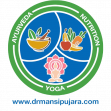
Hypertension is the most common health problem in our country with more number of cases in urban than in rural setup. It is a major risk factor for cardiovascular disease (especially stroke, angina), renal disease and retinopathy.
DASH stands for Dietary Approaches to Stop Hypertension. The DASH diet is a step towards healthy eating that’s created to help treat or prevent high blood pressure (hypertension). The diet is simple:
• Eat more fruits, vegetables, and low-fat dairy foods
• Cut back on foods that are high in saturated fat, cholesterol, and trans fats
• Eat more whole-grain foods, fish, poultry and nuts
• Limit sodium, sweets, sugary drinks, and red meats
The DASH diet suggests getting:
• Grains: 7-8 daily servings( whole wheat bread and rolls, whole wheat pasta, pita bread, bagel, cereals, grits, oatmeal, brown rice, unsalted pretzels and popcorns)
• Vegetables: 4-5 daily servings (broccoli, carrots, collards, green peas, green beans, kale, lima beans, potatoes, spinach, sweet potatoes, tomatoes)
• Fruits: 4-5 daily servings (apples, apricots, bananas, dates, grapes, oranges, grapefruit, mangoes, melons, peaches, pineapples, strawberries)
• Low-fat or fat-free dairy products: 2-3 daily servings (skim or low fat milk, buttermilk, fat free or low fat cheese, frozen yoghurt)
• Meat, poultry, and fish: 2 or less daily servings (select only lean; trim away visible fats; broil, roast, or poach; remove skin from poultry)
• Nuts, seeds, and dry beans: 4-5 servings per week (almonds, hazelnuts, peanuts, walnuts, sunflower seeds, split peas)
• Fats and oils: 2-3 daily servings (vegetable oil such as canola, corn, olive or safflower, low fat mayonnaise)
• Sweets: try to limit to less than 5 servings per week (preferably home made sweets, made from jaggery or dates)
DASH DIET: SODIUM LEVELS
There is a strong association between the salt intake and blood pressure. Risk of hypertension is low in populations consuming less than 3g salt per day. All food substances contain sodium, but added salt is the major source of sodium in our diet.
Sodium content in natural diets, in general will be about 300-400mg a day.
• Standard DASH diet. You can consume up to 2,300 milligrams (mg) of sodium a day.
• Lower sodium DASH diet. You can consume up to 1,500 mg of sodium a day.
FOODS HIGH IN ADDED SALT:-
The following list of food products need to be consumed in moderation or should be avoided depending upon the severity of the condition.
• Pickles, chutneys, sauce and ketchup.
• Papads, chips and salted biscuits.
• Bakery foods.
• Frozen foods.
• Cheese and salted butter.
• Canned vegetables and preserved foods.
• Canned and bottled citrus drinks.
• Readymade soup packets.
• Dried salted fish.
• Dried fruits
DASH diet: Alcohol and caffeine
• Drinking too much alcohol can increase blood pressure. The Dietary Guidelines for Americans recommends that men limit alcohol to no over two drinks a day and women to one or less.
• The DASH diet doesn’t address caffeine consumption. But caffeine can cause your blood pressure to rise at least temporarily.
Putting the pieces of the DASH diet together
• Change gradually.
• Reward successes and forgive slip-ups.
• Add physical activity.
• Get support if you need it.
Remember, healthy eating isn’t an all-or-nothing proposition. What’s most significant is that, on average, you eat healthier foods with plenty of variety — both to keep your diet nutritious and to avoid boredom or extremes. And with the DASH diet, you will have each.
Hope this was helpful !!
Dr. Mansi Pujara’s Clinic


